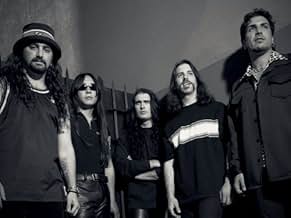Metal Evolution
- Serie TV
- 2011–2014
VALUTAZIONE IMDb
8,5/10
2765
LA TUA VALUTAZIONE
Aggiungi una trama nella tua linguaA journey through heavy metal's roots and evolution, featuring interviews with rock legends and industry insiders. Myths are challenged as the genre's depth and impact are revealed through c... Leggi tuttoA journey through heavy metal's roots and evolution, featuring interviews with rock legends and industry insiders. Myths are challenged as the genre's depth and impact are revealed through candid talks with stars from iconic bands.A journey through heavy metal's roots and evolution, featuring interviews with rock legends and industry insiders. Myths are challenged as the genre's depth and impact are revealed through candid talks with stars from iconic bands.
- Premi
- 1 candidatura in totale
Sfoglia gli episodi
Recensioni in evidenza
I thought the show was interesting and am sometimes shocked at how some of the performers, such as Metallica and Slayer, seem to be oh so very human during their interviews. The origins of metal, according to the show, developed during the Elvis Presley era. Which, I think is a bit far fetched. To me, the first heavy metal song was Helter Skelter by the Beatles. I also never considered bands like Nirvana and Pearl Jam having anything to do with metal. I always considered them more on the lines of punk rock. I thought the documentary was well done. Bringing up bands like Blue Cheer was great, because I had always thought they never got their due. All in all, it's still Rock and Roll to me.
Metal Evolution is an 11 episode documentary that looks at the influence of Heavy Metal and chronologically how it changed stylistically to form the different genres, glam, power metal, death, trash etc. It starts with how heavy metal came to be in the 70s, what influenced the musicians to create this new form of music. Personally I found it rather generic as it can be argued that most if not all forms of modern music can directly draw its roots from classical, jazz or blues. From there it follows a chronological timeline from the 70s to the present day. Each episode ends with how the genre in that episode led to another genre. So each new episode is a new genre. The narrative includes the narrotors personal view of the music as well as interviews with musicians, magazine editors, music writers and even anthropologist. Some of the linkage IMO is rather far fetched, example is grunge being a genre of metal. Yes it can be argued that some grunge musicians listened metal and definitely grunge happened as a backlash to glam metal. But stylistically grunge is more a descendant of punk. (creed was totally disavowed by all...hahahaha). In summary an entertaining piece of work with a lot of information and personal perspective from the musicians involved.
I first heard of "Metal Evolution" when creator, and narrator, Sam Dunn went on VH1's "That Metal Show" to talk about the series. As I am always interested to hear new music, especially older bands that I had overlooked, I tuned in and instantly got more than I bargained for. Dunn crafts the show so that you get a current view of a metal sub-genre along with it's past and it's influences. Often I would leave an episode with a list of 5-6 bands that I had never heard of (or never cared to listen to) and would immediately be happy as I worked through new set lists on Spotify.
Best of all, this show not only appealed to myself (self-professed metal head), but my wife who wants nothing to do with heavy metal music. While my wife won't be picking up any of the new bands from the show, she was interested in the evolution of the music and seeing how current metal music tied back to bands that she was already aware of. While there are some episodes that I particularly didn't care for (grunge / nu-metal) I still found the shows to be extremely interesting.
Best of all, this show not only appealed to myself (self-professed metal head), but my wife who wants nothing to do with heavy metal music. While my wife won't be picking up any of the new bands from the show, she was interested in the evolution of the music and seeing how current metal music tied back to bands that she was already aware of. While there are some episodes that I particularly didn't care for (grunge / nu-metal) I still found the shows to be extremely interesting.
Put simply - to date (2022) this is the best heavy metal music documentary. The author really tried hard to explore the origins of nearly every subgenre and the genre as a whole and the directions it is heading. Plenty of metal legends interviews, everything is greatly structured, great camera work and great editing.
My only remarks are these: the company behind the documentary seems to explore North America and UK music only and fails to understand what is really going on when it goes East of UK. This applies both to "Metal Evolution" and "This is Pop" which is now on Netflix. So speaking of North America and UK everything is fine, everything is explained in great detail and well structured. But once they go to the actual part of Europe is where things go bad, because both movies show lack of proper understanding of both the European music roots and the European music culture. To be honest I will credit only these two documentaries, as these two are the only ones I have seen entirely. So far I started "Hip Hop Evolution", but I am still not past Season 1 Episode 4, so will refrain from commenting this one.
As for "Metal Evolution", there are basically few weak points. First thing I noticed was also lack of enought attention towards Sepultura. Sepultura was iconic superstar band in the trash era and they barely mentioned it. Sure, they used "trash legends" when mentioned it and there was a short interview with Max Cavalera, but that was it. There was nothing about the innovative solo sound which Andreas Kisser tried to do either. But Sepultura is a Brasilian band. So maybe Banger Films fail to properly understand everything which is outside North America and UK, not just Europe.
I don't think there was enough depth shown for the death metal genre either. Also while not a metal band, I think Red Hot Chilli Peppers deserved a proper mentioning in the grunge episode.
One other thing missing was mentioning the Goth metal genre and the industrial genre. However I assume there was not enough budget for these. Still - goth metal was huge in the mid 90s to the mid 2000s approximatelly, pioneered by the legendary Paradise Lost and this band was more than deserving to be shown. Speaking of industrial, this could be a huge topic, but mentioning at least Front 242, Ministry and KMFDM was needed.
One serious flaw I noticed was the power metal episode. Dude, how is it possible you did not properly understood what power metal is about ?? Sure, there was some imagery with bands like Manowar, but hell the power metal (and the speed metal and so on) was never about that! Helloween (respectively Gamma Ray), Blind Guardian and the rest - these are first and foremost about musicianship - all of them are amazing musicians. The hell - listen to some covers they did - everything is amazing, the same way as once a friend of mine could not differentiate Dream Theater doing a Kansas song cover. In the case of Blind Guardian for example or Gamma Ray - the covers they do are signed with a signature tones, very distinguishable. So first and foremost as I said - this metal is about being a great musician. Then the litemotif of the entire genre is the narrative - it is not just the European folklore, yes it started there, but it could be anything - it is all about a well told story. Yes - storytelling!! Expanding the J. R. R. Tolkien narrative with some new ornaments, adding a brush stroke on the Dune universe ("Traveler in Time" -Blind Guardian) or Stephen King (again Guardian) or praising the pirate adventures (Running Wild) or the good times of Nightwish with Tarja and the stories they have told! Why do you think we all listen to this music - it inspires us to dream with the stories they tell and this is exactly why bands like Blind Guardian put bard pictures on their covers, because it is all about storytelling! It may started with Rainbow and R. J. Dio continued in albums like "Holy Diver", but it lives on! For the sake of everything, the catchy melodies come in the very end of the whole thing!! Stick this in your pipe and smoke it once and for all!!
I also noticed there was nothing about the symphonic metal genre, which evolved out of the power metal to me and was and I guess to a degree is still a huge hit in Europe. But for example the super-famous album "Theli" of Therion came out in 1996, so no excuse a documentary in 2011 not to mention it. Therion pioneered the genre and lead hordes of Scandinavian bands after them.
No mentioning of the doom metal as well. Bands as Asphyx need a serious mention here.
And there were some experimental bands which also needed few words to be told, like Tiamat for example.
Anyway. I will attribute all this to the lack of budged, except the fail to understand the power metal. Everything else was fine, well researched and well told.
I still recommend watching this in 2022.
My only remarks are these: the company behind the documentary seems to explore North America and UK music only and fails to understand what is really going on when it goes East of UK. This applies both to "Metal Evolution" and "This is Pop" which is now on Netflix. So speaking of North America and UK everything is fine, everything is explained in great detail and well structured. But once they go to the actual part of Europe is where things go bad, because both movies show lack of proper understanding of both the European music roots and the European music culture. To be honest I will credit only these two documentaries, as these two are the only ones I have seen entirely. So far I started "Hip Hop Evolution", but I am still not past Season 1 Episode 4, so will refrain from commenting this one.
As for "Metal Evolution", there are basically few weak points. First thing I noticed was also lack of enought attention towards Sepultura. Sepultura was iconic superstar band in the trash era and they barely mentioned it. Sure, they used "trash legends" when mentioned it and there was a short interview with Max Cavalera, but that was it. There was nothing about the innovative solo sound which Andreas Kisser tried to do either. But Sepultura is a Brasilian band. So maybe Banger Films fail to properly understand everything which is outside North America and UK, not just Europe.
I don't think there was enough depth shown for the death metal genre either. Also while not a metal band, I think Red Hot Chilli Peppers deserved a proper mentioning in the grunge episode.
One other thing missing was mentioning the Goth metal genre and the industrial genre. However I assume there was not enough budget for these. Still - goth metal was huge in the mid 90s to the mid 2000s approximatelly, pioneered by the legendary Paradise Lost and this band was more than deserving to be shown. Speaking of industrial, this could be a huge topic, but mentioning at least Front 242, Ministry and KMFDM was needed.
One serious flaw I noticed was the power metal episode. Dude, how is it possible you did not properly understood what power metal is about ?? Sure, there was some imagery with bands like Manowar, but hell the power metal (and the speed metal and so on) was never about that! Helloween (respectively Gamma Ray), Blind Guardian and the rest - these are first and foremost about musicianship - all of them are amazing musicians. The hell - listen to some covers they did - everything is amazing, the same way as once a friend of mine could not differentiate Dream Theater doing a Kansas song cover. In the case of Blind Guardian for example or Gamma Ray - the covers they do are signed with a signature tones, very distinguishable. So first and foremost as I said - this metal is about being a great musician. Then the litemotif of the entire genre is the narrative - it is not just the European folklore, yes it started there, but it could be anything - it is all about a well told story. Yes - storytelling!! Expanding the J. R. R. Tolkien narrative with some new ornaments, adding a brush stroke on the Dune universe ("Traveler in Time" -Blind Guardian) or Stephen King (again Guardian) or praising the pirate adventures (Running Wild) or the good times of Nightwish with Tarja and the stories they have told! Why do you think we all listen to this music - it inspires us to dream with the stories they tell and this is exactly why bands like Blind Guardian put bard pictures on their covers, because it is all about storytelling! It may started with Rainbow and R. J. Dio continued in albums like "Holy Diver", but it lives on! For the sake of everything, the catchy melodies come in the very end of the whole thing!! Stick this in your pipe and smoke it once and for all!!
I also noticed there was nothing about the symphonic metal genre, which evolved out of the power metal to me and was and I guess to a degree is still a huge hit in Europe. But for example the super-famous album "Theli" of Therion came out in 1996, so no excuse a documentary in 2011 not to mention it. Therion pioneered the genre and lead hordes of Scandinavian bands after them.
No mentioning of the doom metal as well. Bands as Asphyx need a serious mention here.
And there were some experimental bands which also needed few words to be told, like Tiamat for example.
Anyway. I will attribute all this to the lack of budged, except the fail to understand the power metal. Everything else was fine, well researched and well told.
I still recommend watching this in 2022.
Canuck head banger Sam Dunn examines the evolution of heavy metal from the same anthropological viewpoint as his "Metal" documentary films. Metal Evolution is more of the same globe-trotting adventures of Dunn and crew as they examine the origins of the beast from the smoking cauldrons of Birmingham to the back streets of New York in the 1970s.
Dunn plays to his audience and those uninterested in metal might not really enjoy such a detailed examination of the various sub-genres of metal. For those who are more denim and leather inclined, metal evolution provides a treasure trove of interviews with such "metal gods" as Rob Halford, Geezer Butler, and even such "proto-punk"(I hate that term) legends as Iggy Pop. Dunn is entirely methodical in his examination of the genre, and this is clearly a labour (yes I am Canadian, that is a U) of love for Dunn.
What is truly great about Metal Evolution is the sheer grandiosity of the examination. Every major sub-genre is covered (Yes, even the much maligned "Nu-Metal"). If the words "Black Metal, Death Metal, and Power Metal" don't strike any chords in your hardened heart, then Metal Evolution will probably not be worth your time. I truly loved every minute of this series so far, and it is great to see such a documentary in the era of "bands" (I use the term loosely) such as LMFAO and Hedley who are about as heavy as non-alcoholic Labatt's. Yes, Metal (CAPITAL!!!) is back and Dunn's examination proves once and for all that metal is not for the weak, nor is it for the unenlightened. Dunn, a University Graduate and scholar proves that metal is an intensely complex genre full of musical diversity and a list of "characters" that are equally complex. Overall, an absolute must for anyone who has been known to throw up the horns in salute to the world's most misunderstood form of music. METTTTTTTAALLLLLLLLLLLL!!!!!!!
Dunn plays to his audience and those uninterested in metal might not really enjoy such a detailed examination of the various sub-genres of metal. For those who are more denim and leather inclined, metal evolution provides a treasure trove of interviews with such "metal gods" as Rob Halford, Geezer Butler, and even such "proto-punk"(I hate that term) legends as Iggy Pop. Dunn is entirely methodical in his examination of the genre, and this is clearly a labour (yes I am Canadian, that is a U) of love for Dunn.
What is truly great about Metal Evolution is the sheer grandiosity of the examination. Every major sub-genre is covered (Yes, even the much maligned "Nu-Metal"). If the words "Black Metal, Death Metal, and Power Metal" don't strike any chords in your hardened heart, then Metal Evolution will probably not be worth your time. I truly loved every minute of this series so far, and it is great to see such a documentary in the era of "bands" (I use the term loosely) such as LMFAO and Hedley who are about as heavy as non-alcoholic Labatt's. Yes, Metal (CAPITAL!!!) is back and Dunn's examination proves once and for all that metal is not for the weak, nor is it for the unenlightened. Dunn, a University Graduate and scholar proves that metal is an intensely complex genre full of musical diversity and a list of "characters" that are equally complex. Overall, an absolute must for anyone who has been known to throw up the horns in salute to the world's most misunderstood form of music. METTTTTTTAALLLLLLLLLLLL!!!!!!!
Lo sapevi?
I più visti
Accedi per valutare e creare un elenco di titoli salvati per ottenere consigli personalizzati
- How many seasons does Metal Evolution have?Powered by Alexa
Dettagli
- Data di uscita
- Paese di origine
- Lingua
- Celebre anche come
- Hårdrockens historia
- Azienda produttrice
- Vedi altri crediti dell’azienda su IMDbPro
- Colore
Contribuisci a questa pagina
Suggerisci una modifica o aggiungi i contenuti mancanti

Divario superiore
By what name was Metal Evolution (2011) officially released in India in English?
Rispondi






























